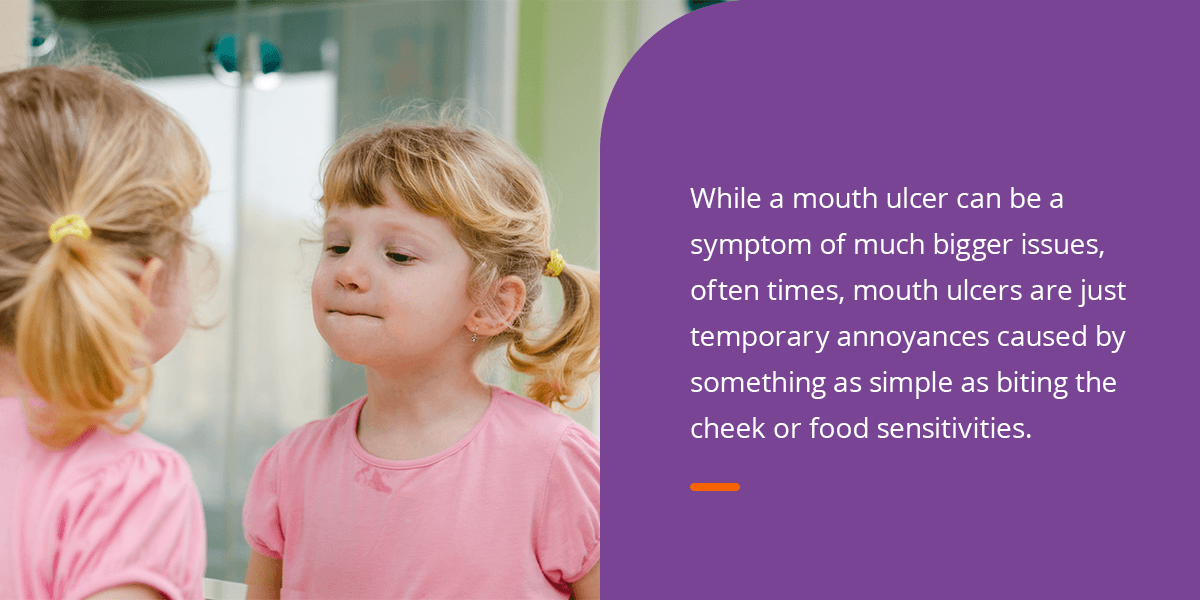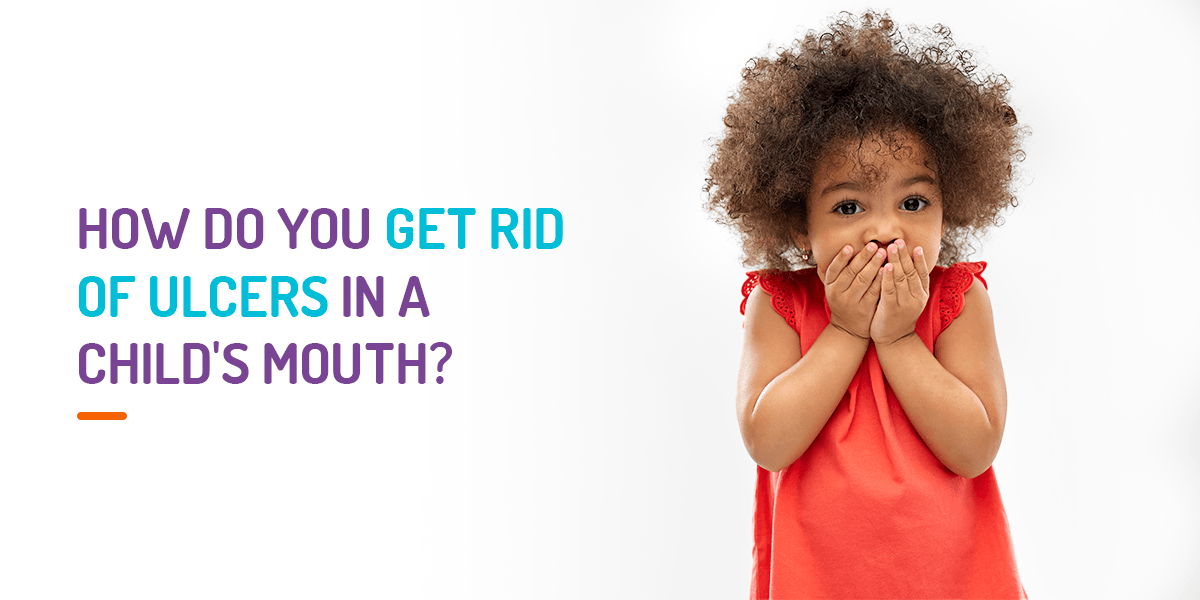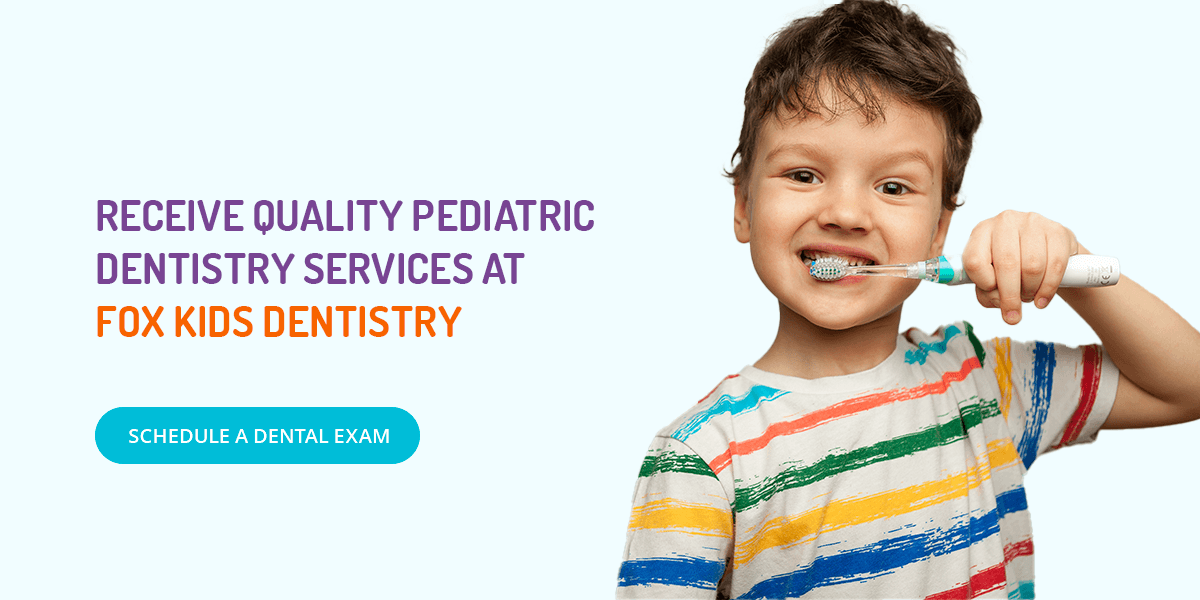If your child has mouth ulcers, they might alert you by either crying, whining or refusing to eat or drink. We know that as a parent, you’ll do whatever it takes to relieve your child of pain and discomfort. Especially for parents of younger children, your child may not be able to verbalize what is wrong.
Since many people experience a mouth ulcer at some point in their life, it’s smart to be aware of the symptoms and common treatment methods so you can quickly help your child on the road to recovery — even if they can’t verbally tell you what’s wrong.
Call to Schedule A Dental Appointment
To help, we’ve created a complete overview of pediatric mouth ulcers so you can confidently identify, treat and prevent mouth ulcers in your children.
What Are Mouth Ulcers?
Mouth ulcers are lesions within the mouth that make talking, eating and drinking uncomfortable or painful. Ulcers can affect all parts of the mouth, including the lips, gums, tongue or other inside parts of the mouth. Typically, mouth ulcers appear as a creamy-white color, but they may also be yellow or red. While these ulcers are typically small in size, their symptoms are strong and make it impossible to ignore their presence.
Typical symptoms of mouth ulcers include:
- Swollen skin around the area of the sore
- Difficulty or pain when chewing, talking or brushing teeth
- Irritation from spicy, sour or salty foods
- Loss of appetite
What Causes Ulcers in a Child’s Mouth?
Ulcers are caused by the erosion or loss of the mucous membrane, which is the delicate tissue that lines the mouth. There are a lot of potential causes for a pediatric mouth sore. While a mouth ulcer can be a symptom of much bigger issues, often times, mouth ulcers are just temporary annoyances caused by something as simple as biting the cheek or food sensitivities.

Common causes of mouth ulcers include:
- Accidentally biting the cheek or lips
- Burns from eating hot food
- An allergic reaction to oral bacteria
- Viral, fungal or bacterial infections such as cold sores or hand, foot and mouth disease
- Food sensitivities to acidic food and drinks
- Nutrient deficiencies like vitamin B12, vitamin B9, iron and zinc
- Autoimmune diseases, including celiac disease
Why Does My Kid Keep Getting Mouth Ulcers?
If your child’s mouth ulcers are caused by a food sensitivity or nutrient deficiency, it is likely you’ll see ulcers reoccur until these issues are resolved. However, canker sores are the main cause of reoccurring mouth ulcers in children. Canker sores will only develop as one or two mouth ulcers at a time and are most common in children five years or older.
The most common cause of multiple mouth ulcers — more than two at a time — is the coxsackie virus, most commonly known as hand, foot and mouth disease. This is most common in children ages 1 to 5.
If your child continuously suffers from mouth ulcers, you’ll want to talk to your doctor or dentist, and keep track of their symptoms and potential causes. Scheduling preventive dental care for your child is a great way to improve your child’s oral hygiene and prevent issues like mouth ulcers.
Some other ways to prevent mouth ulcers include:
- Avoiding mouthwashes or toothpaste with sodium lauryl sulfate (SLS)
- Using soft-bristled toothbrushes
- Discouraging talking while chewing to avoid accidental bites
- Reducing spicy or acidic foods
- Maintaining good oral hygiene
How to Treat Ulcers in a Child’s Mouth
Most often, mouth ulcers will go away on their own with some patience. However, there are some options to help soothe your child’s symptoms.
At-Home Remedies
There are several mouth ulcer home remedies for children. These at-home treatment methods can help decrease healing time and pain.
Common at-home mouth ulcer treatments include:
- Over-the-counter painkillers: Tylenol or ibuprofen can help minimize any pain caused by mouth ulcers. Always follow the directions and suggested dosage on the packaging when giving your child painkillers.
- Dental pastes and liquid antacids: Maalox or milk of magnesia can also be used to help soothe discomfort or pain. These products will coat the ulcer and calm the area.
- Topical anesthetics: Topical anesthetics can be used to help numb the mouth and relieve mouth ulcer pain. This treatment must be physically applied to the area. Popular over-the-counter options include Orajel and Anbesol.
- Antiseptics: When antiseptics are used as a mouthwash twice a day, they can help reduce mouth ulcer symptoms. Peridex and Cepacol are two common antiseptics used in treating mouth ulcers. While this is a good treatment option, your child may not be too keen on this method. For younger children, you may want to consider one of the other options in this list.
- Saltwater rinses: Another rinse option is a warm saltwater rinse. Your child will need to be old enough to safely gargle liquids for this method to be effective.
- Natural remedies: There is research to support that some natural substances like echinacea and licorice root can be effective mouth ulcer treatments. These substances can come in a variety of forms, from oils to teas, so there are plenty of ways you can incorporate this into your treatment plan after speaking with your child’s doctor.
Professional Treatment
For more severe mouth ulcers, or for extra peace of mind, you can visit your child’s doctor or dentist. If needed, your child may be prescribed steroids to aid in the healing process.
Most of the time, a doctor’s visit is not necessary, but it’s good to know the warning signs of when a doctor’s visit is needed for your child’s mouth ulcer. Visit a doctor or dentist if you notice:
- Unusually large ulcers
- New ulcers appearing
- Ulcers that last more than three weeks
- Unmanageable pain, even with over-the-counter and natural medicine use
- Severe trouble eating or drinking
- High fever
Receive Quality Pediatric Dentistry Services at Fox Kids Dentistry
Are you in need of a pediatric dentist in the Portland, Oregon area? Look no further — at Fox Kids Dentistry, we specialize in working with children to help them feel comfortable and build proper oral hygiene skills. When children have good oral hygiene, they’re less likely to suffer from mouth ulcers and other mouth diseases.
As parents ourselves, we’re here to help in any way we can. That includes emergency services for our patients who are suffering from severe mouth ulcers or other mouth pain. Provide your child with a happier, healthier smile and schedule a pediatric dental exam today!


